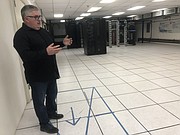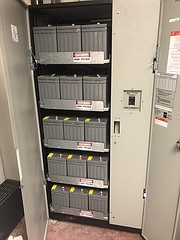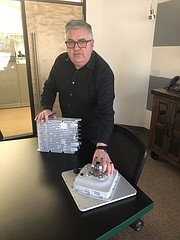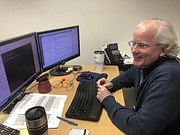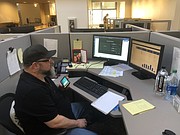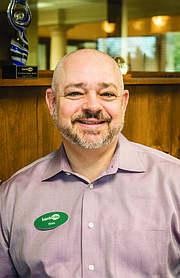THE BROADBAND CHALLENGE
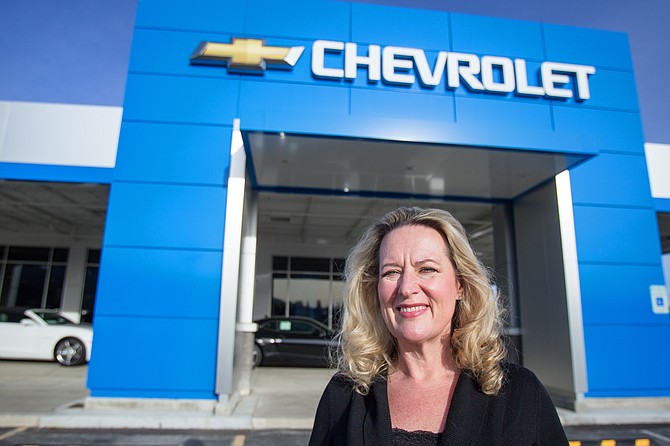
Eve Knudtsen, president of Knudtsen Chevrolet Co.
Gone are the days when bodies filled lobbies with car buyers and bank customers.
Sure, there are still those among us who have to kick a tire and feel the acceleration before signing on the dotted line for that new SUV. Some of us still enjoy taking our paychecks to the bank and walking out with actual cash and a physical receipt, knowing our hard-won reward has been properly credited to our account while seeing a friendly face and exchanging small talk.
But times have changed, and to stay in business — to actually prosper and grow — executives like Eve Knudtsen and Wes Veach have had to stay ahead of the game. And they’ll be the first to admit they couldn’t do it alone.
Broadband is no longer a luxury. It’s the lifeblood of industry, a necessary partner.
“Our society is on the move, on the go — everything is mobile and online,” said Knudtsen, dealer principal at Knudtsen Chevrolet in Post Falls. “If I didn’t have broadband, I’d be out of business.”
“Internet banking is a huge part of the business and it continues to grow,” said Veach, president and CEO of bankcda. “It’s become a way of life. We only have four branches but we have customers all over the country.”
In Knudtsen’s case, every minute matters for an online customer. Say somebody’s searching for a 2021 Silverado. “If you click on me because I’ve got the truck you want, you might wait 30 minutes, but if you haven’t gotten a response from me, you’re on to the next dealer,” Knudtsen said. Doesn’t matter if it’s 2:30 p.m. or 2:30 a.m. That customer is not going to wait.
For Veach, too, the need for transactional speed has only increased over the years.
“What used to take seven days for a check to clear, clears in a day now,” said Veach, who started in the business 25 years ago as a teller. “I remember lines all day long, people waiting to see a teller. Now we don’t ever have lines.”
What they do have, Knudtsen and Veach said, is a powerful local ally to help them succeed.
LOCAL BROADBAND BRAND
Mike Kennedy’s business has grown right alongside those of Veach and Knudtsen, both as a reflection of societal changes but also because of a symbiotic relationship that has strengthened all partners. Kennedy is president and CEO of Intermax Networks in Coeur d’Alene.
The name of Kennedy’s game goes far beyond providing internet service, or phone service, or even IT systems management. At Intermax, those three vital business functions have all been brought under one roof for a growing number of customers — primarily in what Kennedy calls “the sweet spot” of businesses with 50 to 100 employees.
Why?
“One-stop shop,” Knudtsen said simply.
Knudtsen explained that instead of dealing with three separate companies — vendors adept at pointing fingers at one another when something somewhere goes wrong — she needs just one. She watched as Kennedy brought in respected computer guru Pat Whalen and then phone pro Tad Thompson.
“Intermax would provide the actual fiber, and then Pat’s group does my hardware and makes sure everything is connecting and communicating,” she said. “They brought Tad Thompson in for phones and it made my communication so much easier. That’s where it came together for us: We don’t have to figure out where the problem is. We make one call and it’s taken care of.”
INTERMAX REACHES OUT
Locally owned Intermax has been at the head of the charge not just to ensure business of any size has the horsepower to compete in Kootenai County, but to get broadband into the furthest reaches of rural North Idaho. It’s a daunting and expensive task, Kennedy said, but one his company has eagerly embraced.
Whether it’s business or residential — Intermax serves both, with company revenue about 50 percent each — “we have a system where the objective is universal service,” Kennedy said. “The cost of rural service is subsidized by the density of urban service. Fiber broadband is a free market system with many suppliers, all attracted to more dense areas. The availability of low-cost service to remote locations is complicated.”
It’s complicated, but that hasn’t kept people like Kennedy, Gov. Brad Little and Idaho Commerce Director Tom Kealey from tackling the rural challenge head-on. Kennedy raves about the work being done by Little and Kealey to bolster Idaho economic development through broadband initiatives, including the governor’s creating a state broadband office.
“They do a great job of facilitating communication and raising awareness of grant opportunities,” Kennedy said.
LINING UP PARTNERS
One of the keys going forward, Kennedy said, is building upon an already strong base of public-private partnerships to ensure businesses, residents, schools and others all have ample bandwidth to do whatever it is they need or want to do.
For instance, while fiber costs an average of about $30,000 per mile — a very rough estimate that can change dramatically based on ruggedness of terrain and other factors — a company like Intermax can significantly reduce costs to customers by teaming up with local governments and utilities.
The company could partner with a city to install fixed wireless radio on a water tower and the roof of city hall, for example, ensuring clear signal paths. In exchange for that access, maybe the city gets a nice discount on its internet, phone and IT services.
Same goes for Intermax using a utility company’s power poles for above-ground broadband, and the Idaho Transportation Department for shared fiber conduits underground.
“I just can’t say enough about what Gov. Little and Tom Kealey have been doing to make these kinds of partnerships possible,” Kennedy said. “Opening up ITD’s right of ways is huge.”
In addition to public-private partnerships, Kennedy is a proponent of “coopetition” — cooperating with other Kootenai County providers Ziply, TDS, Zayo and Spectrum on mutually beneficial projects one day while competing with them the next.
Kennedy asserts that when it comes to economic development, Kootenai County is amply equipped.
“Business growth in the county can get the broadband they need wherever they are, be it fiber or high-capacity fixed wireless,” he said. And in the more rural areas, that mission is well under way.
Intermax is in the second year of a 10-year public-private investment to build out most rural North Idaho areas, yet already is about a quarter of the way done. “We put money up front,” he said, “and it gets reimbursed as we build out.”
Intermax also participated in a Federal Communications Commission auction to purchase licensed spectrum in all five northern counties — meaning no interference with faster speeds. It cost half a million dollars, but Intermax succeeded in carving out an important niche against the big boys.
THE SIX-MONTH MIRACLE
Partnering with the state and accessing the CARES Act, Intermax took on 24 projects in three northern counties that all had to be done by the end of 2020. Seventeen of the projects were in Kootenai County, six in Boundary and one in Benewah.
“We completed them all in six months,” Kennedy said proudly, then added with a laugh: “Damn near killed us.”
Kennedy laughs quite a lot these days because business is good, and getting better. When he started at Intermax 15 years ago this October, the company had three employees and 350 customers. Today, Intermax has 72 employees and more than 5,000 customers — some representing a new wave of remote workers/full-time residents.
That’s significant to Kennedy, who like Knudtsen is heavily involved in regional economic development efforts. Knudtsen is a former board member and chair of what used to be known as Jobs Plus but now goes by Coeur d’Alene Area Economic Development Corporation. Kennedy serves as CDAEDC’s vice chairman.
Kennedy emphasizes that getting sufficient broadband to all the inhabitants of North Idaho, for personal and professional reasons, needs to be done in cooperation with government resources, not despite them.
“Government is not your enemy here,” he said, citing the work of Little, Kealey and others in particular. “We just need to work together constructively.”
The governor emphasized the need for that continuing cooperation, which he was encouraging the Legislature to embrace in mid-March.
"As part of my ‘Building Idaho’s Future’ plan, which is making its way through the Legislature right now, I am seeking $35 million for new investments in internet connectivity for underserved areas to improve commerce, economic growth, and education," he told BJNI on March 15. "That’s on top of the $50 million in broadband infrastructure investments we made last year with federal coronavirus relief dollars.”
THE NEED IS CLEAR
Knudtsen said shortcomings in broadband access have been exposed during the past year, with the urgency of solutions glaringly apparent.
“Look at what happened to education during the pandemic,” she said. “We need strong broadband. We need to expand access to medical care. If we want to keep our economy growing, we have to have access to reliable broadband.”
Bankcda’s Veach put it this way: “Without a robust internet, I think you’re going to have a hard time attracting businesses here.”
With partners like Intermax, though, Veach said the future is bright.
“We love Intermax to death,” he said. “They’re a local business — to have a local company that provides such quality phone and internet service is outstanding.”
High praise echoed all the way from Boise, too — directly from the governor.
“I would like to thank Intermax Networks for being an integral part of our continued investment in broadband in Idaho," Gov. Little said. "Expanded broadband infrastructure ensures communities across Idaho have improved opportunities for economic development and education and generally a better quality of life."

